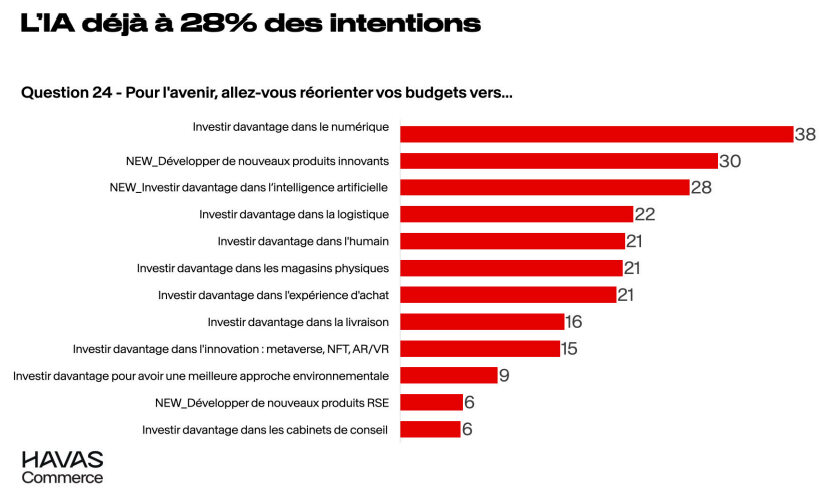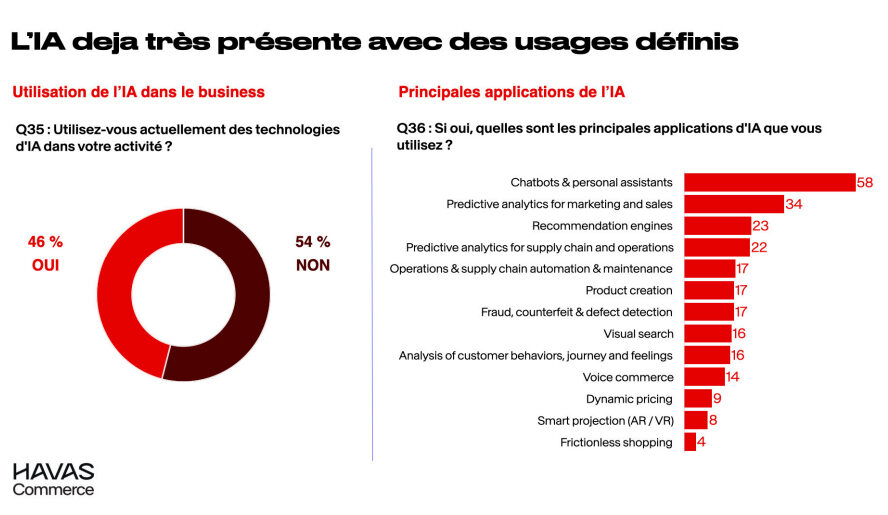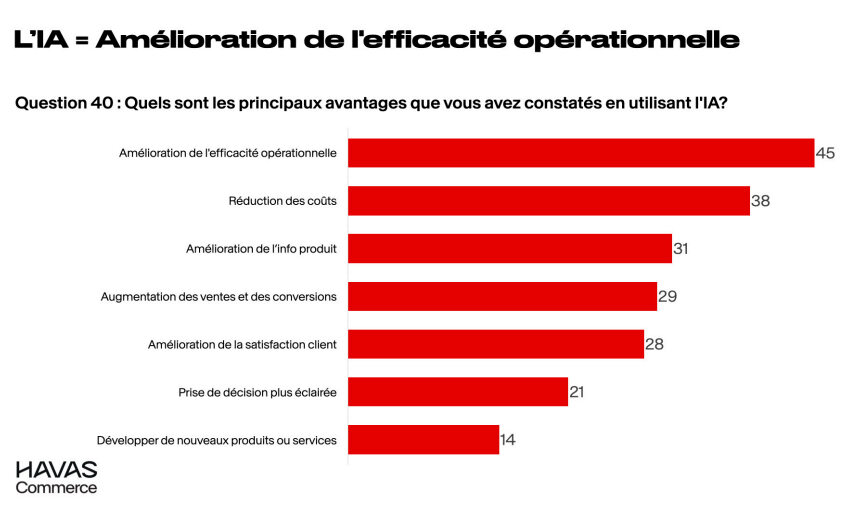Translated by
Roberta HERRERA
Published
September 20, 2024
The majority of international retailers – 79% – agree that artificial intelligence will fundamentally change the face of commerce in the coming years. However, despite its perceived potential, 54% of them have yet to introduce AI into their systems, according to a Havas survey of 500 retailers in 21 countries*, revealed on September 17 during Paris Retail Week.

When asked about their investment strategies in the current economic environment, 38% of respondents indicated that increased investment in digital transformation is their top priority. This was followed by the development of innovative products, mentioned by 30%, with 28% focusing more on artificial intelligence. Meanwhile, investments in the metaverse, NFTs or augmented and virtual reality fell to 15%, signaling the end of a hype cycle.
Artificial intelligence ranked as the second most promising technological innovation, with 74% of respondents (39% of whom rated it “very promising”). However, it lags behind faster delivery services, which were favored by 93% of merchants. Other top innovations included cashless stores (73%), biometric payment systems (66%), the use of “super apps” such as WeChat and Alipay (61%) and voice technologies (60%).
Where does AI fit into retailers’ digital transformation strategies? For now, it is mostly seen as an exploratory technology (28%) or a “secondary but important” component (23%). A significant portion, 20%, have not yet integrated AI, and 15% consider it irrelevant to their business. Only 14% of companies surveyed consider AI a “core part” of their strategy.
Clearly defined uses
Currently, 54% of retailers surveyed do not use AI in their operations. For those that do, it is primarily applied through chatbots and personal assistants (58%) and for marketing and sales forecasting (34%). AI is used less often for recommendation systems (23%), predictive inventory and operations management (22%), supply chain automation and maintenance (17%), creative processes (17%) and fraud detection (17%).

Among retailers using AI, the top benefits seen include improved operational efficiency (45%), reduced costs (38%) and improved product information (31%). To a lesser extent, AI has also helped increase sales and conversions (29%), improve customer satisfaction (28%), make more informed decisions (21%) and develop new products or services (14%).
However, AI also presents challenges. Chief among these are the high cost of AI solutions and lack of in-house expertise, cited by 36% and 35% of respondents, respectively. Other concerns include difficulty integrating existing AI systems (27%) and lack of quality data to train AI models (16%).
“This is where all the work on data will have significant consequences,” said Vincent Mayet, founder and CEO of Havas Commerce. “Those who have lagged behind in managing and leveraging data will struggle the most to develop AI, simply because they lack the usable data needed to power it.”
Ethical considerations
Retailers are also concerned about data privacy (32%) and the controversial issue of AI replacing human workers (19%). When asked specifically about the ethical implications of AI, 55% of retailers mentioned the protection of data privacy, 40% mentioned the issue of liability in the event of AI errors, and 39% highlighted the potential loss of jobs. In fact, 35% of the panel believe AI will destroy jobs, compared to 43% who believe it will only transform them. Meanwhile, 21% predict an increase in skilled AI-related jobs.

Among other ethical concerns, the group highlighted the transparency and accountability of AI systems (31%), especially as more providers enter the market. Some 27% fear their data may be collected by AI giants, and 19% fear algorithmic biases and possible discrimination. Retailers also raised the issue of compliance with local laws (11%) and the dominance of US and Chinese AI companies, seen by some as a worrying oligopoly.
Strategies against the backdrop of economic uncertainty
The Havas Commerce survey also explored the top concerns of today’s retailers. Updating their systems to keep up with new technologies ranked third (13%), just behind geopolitical instability (14%), but well below economic concerns (46%). For 59% of the companies surveyed, the peak of inflation has not yet been reached, and 83% say they are affected by the geopolitical situation.
In response to these challenges, businesses focus primarily on diversifying revenue streams (76%), increasing prices of goods and services (72%), reducing material expenses (67%) and, in particular, promoting new programs of loyalty (61%). .

Have retailers adjusted their product range? Globally, 19% of respondents said they had moved towards premiumization in the past year, while 36% saw a downward trend. This shift is most pronounced in the Americas, with 21% premiuming and 42% discounting, as well as Europe, where 14% moved up and 32% moved down. Europe, however, stands out for its strong tendency to maintain existing product positioning (53%).
*The survey was conducted between July 30 and August 19 in the USA, Mexico, Brazil, Denmark, Great Britain, Portugal, United Arab Emirates, Argentina, Sweden, France, Spain, Germany, Poland, Czech Republic, Greece, Italy, India , China, Japan, South Korea and Australia. Respondents included brick-and-mortar retailers, e-commerce, hybrid models, marketplaces and direct-to-consumer businesses.
Copyright © 2024 FashionNetwork.com All rights reserved.
#role #artificial #intelligence #play #international #retailers
